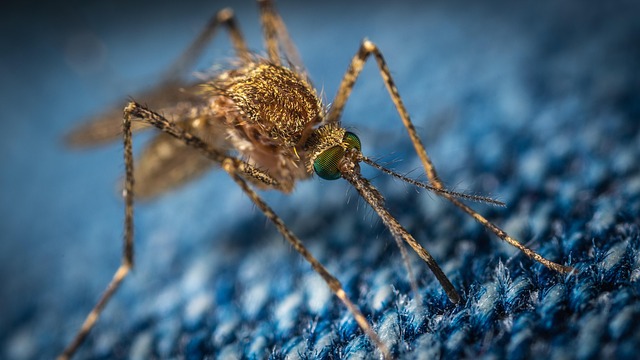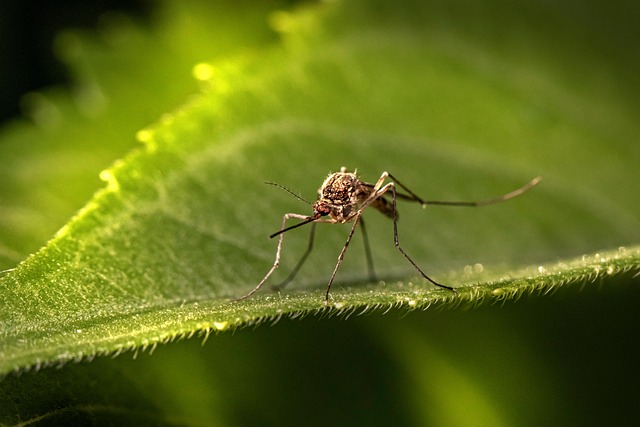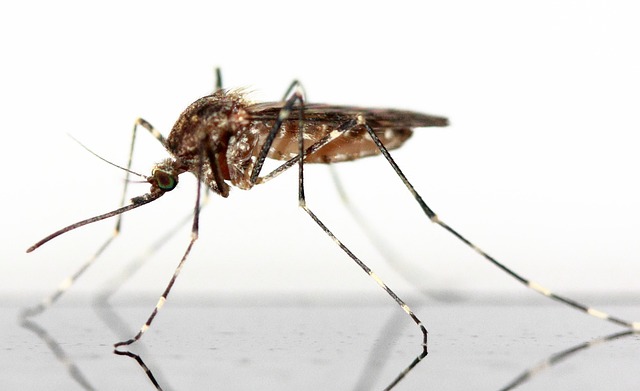Mosquitoes are not only a nuisance but also vectors for diseases like malaria and Zika virus. Their behavior is guided by CO2, heat, and chemicals in sweat, prompting targeted control strategies. Modern methods prioritize integrated pest management (IPM), combining biological controls, chemical treatments, and environmental modifications with residential measures like maintaining clear gutters and using traps or natural repellents. While chemical repellents are effective, they raise health and environmental concerns, pushing towards eco-friendly alternatives like essential oils (citronella, lavender) and plant-based treatments (neem oil, pyrethrum). Eco-friendly strategies focus on reducing standing water, physical barriers (screens, nets), and natural repellents. Community-wide IPM efforts are crucial for long-term mosquito control, balancing human health needs with environmental preservation.
Mosquitoes are more than just a nuisance; they’re vectors for diseases that affect millions globally. Understanding their behavior and habitat is crucial in implementing effective mosquito control. This article delves into various strategies, from traditional methods like insecticides to natural alternatives and targeted treatments. We explore the pros and cons of chemical repellents, discuss environmental impacts, and provide long-term preventive measures. By employing these tactics, communities can better manage mosquito populations and reduce health risks associated with these tiny yet dangerous creatures.
Understanding Mosquitoes: Behavior and Habitat

Mosquitoes are more than just a nuisance; they are tiny vectors that can transmit diseases like malaria, dengue fever, and Zika virus. Understanding their behavior is crucial for effective mosquito control. These insects are most active during dawn and dusk, when they feed on both humans and animals. They are attracted to carbon dioxide, heat, and certain chemicals in our sweat, making outdoor activities during these times more prone to bites. Mosquitoes breed in stagnant water, so eliminating these breeding grounds is a key strategy in mosquito control.
Knowing their habitat helps in developing targeted treatments. In residential areas, this could mean ensuring gutters are clear of debris, emptying standing water from containers, and using mosquito traps or natural repellents like citronella plants. For larger-scale applications, such as parks or urban spaces, integrated pest management approaches that combine biological control (introducing natural predators), chemical treatments, and environmental modifications can be employed to reduce mosquito populations effectively.
Traditional Mosquito Control Methods

Mosquito control has evolved over time, but traditional methods still hold value in certain situations. One of the most well-known and widely used approaches is spraying insecticides, which can be effective in reducing mosquito populations. These chemicals are typically applied to areas where mosquitoes breed, such as stagnant water sources, and can significantly decrease their presence in the environment. Another conventional tactic is using traps that lure and capture mosquitoes, often employing carbon dioxide or synthetic attractants to entice them.
While these traditional methods have been successful, they may not always be the most eco-friendly option, and some mosquitoes seem to develop resistance over time. As a result, modern Mosquito control strategies focus on integrated pest management (IPM), combining various techniques to create a more sustainable approach. This includes biological controls like introducing natural predators, modifying breeding grounds, and using repellents that are safer for the environment and human health.
Chemical Repellents: Pros and Cons

Chemical repellents have long been a go-to for mosquito control, offering both convenience and effectiveness. They’re easily accessible and can provide rapid relief from bites. However, their widespread use has raised concerns about potential health risks and environmental impact. These repellents often contain DEET or similar chemicals, which, while safe when used correctly, can cause skin irritation in sensitive individuals.
Moreover, there’s growing worry about their effect on ecosystems, particularly water bodies, where chemical buildup can harm beneficial insects and other aquatic life. Natural alternatives exist but may not offer the same level of protection as their synthetic counterparts. Thus, it’s crucial to weigh the benefits against potential drawbacks when choosing a mosquito control method that suits your needs without compromising overall health and environmental sustainability.
Natural and Organic Alternatives

In the quest for effective mosquito control, natural and organic alternatives are gaining popularity as eco-friendly options. These solutions offer a harmless approach to managing mosquitoes without relying on chemical-laden sprays or insecticides. Essential oils like citronella, lavender, and peppermint have long been recognized for their insect-repelling properties. Incorporating these scents in candles, diffusers, or topical applications can create a natural barrier against mosquito bites.
Plant-based treatments, such as neem oil and pyrethrum, are also powerful tools in the battle against mosquitoes. Neem oil, derived from the neem tree, possesses insecticidal properties and is safe for use around children and pets. Pyrethrum, on the other hand, is a natural pesticide extracted from chrysanthemum flowers, providing a rapid yet gentle form of mosquito control. These organic alternatives not only reduce exposure to potentially harmful chemicals but also promote a healthier environment.
Environmental Impact of Mosquito Repellents

Mosquito repellent treatments, while effective in controlling and reducing mosquito populations, also have an environmental impact that must be considered as part of any comprehensive mosquito control strategy. Many traditional chemical repellents can harm beneficial insects, disrupt ecosystems, and contaminate water sources if not used properly. Moreover, the overuse of these chemicals can lead to resistance among mosquito populations, rendering them less effective over time.
As such, it’s crucial to explore alternative, eco-friendly methods for mosquito control that balance human health needs with environmental preservation. Natural repellents like citronella, lavender, and neem oil offer safer alternatives, while physical barriers such as screens and nets provide long-lasting protection without the chemical burden. These integrated pest management (IPM) approaches not only reduce environmental impact but also foster a more sustainable and holistic approach to mosquito control.
Targeted Treatments for Specific Areas

When it comes to mosquito control, targeted treatments for specific areas are a highly effective strategy. This approach involves applying repellents or insecticides directly to where mosquitoes breed and rest, such as standing water, vegetation, and shaded areas. By focusing on these hotspots, you can significantly reduce mosquito populations without resorting to broad-spectrum sprays that may harm the environment and other insects.
Targeted treatments offer several advantages. They are more eco-friendly, minimizing the impact on non-target organisms like beneficial bugs and water bodies. They also prove cost-efficient in the long run, as they require less application and coverage area compared to general sprays. Moreover, these methods can be tailored to specific needs, making them ideal for outdoor events, gardens, or even indoor spaces where mosquitoes have become a nuisance.
Preventive Measures: Long-term Mosquito Management

Preventing mosquito problems in the long term involves a comprehensive mosquito control strategy. This includes eliminating standing water, where mosquitoes breed, as well as maintaining proper yard drainage. Regularly cleaning items like flower pots, birdbaths, and old tires can make a significant difference. Installing screens on windows and doors keeps mosquitoes out of homes, while using mosquito nets over beds provides additional protection during sleep.
Additionally, incorporating natural repellents into outdoor spaces can be effective. Plants like citronella, lavender, and marigolds are known to deter mosquitoes naturally. On a larger scale, community efforts to manage water bodies and implement integrated pest management techniques contribute to a more sustainable mosquito control strategy, ensuring better protection for residents over an extended period.
